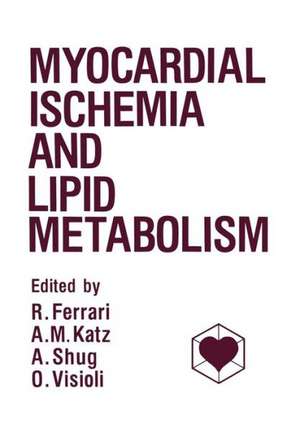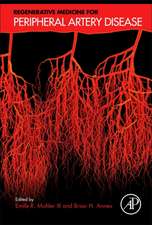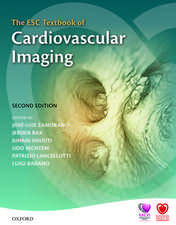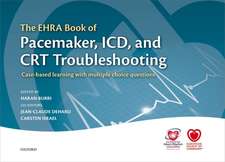Myocardial Ischemia and Lipid Metabolism
Editat de R. Ferrarien Limba Engleză Paperback – 13 mar 2012
Preț: 374.78 lei
Preț vechi: 394.51 lei
-5% Nou
Puncte Express: 562
Preț estimativ în valută:
71.71€ • 75.14$ • 59.28£
71.71€ • 75.14$ • 59.28£
Carte tipărită la comandă
Livrare economică 11-25 aprilie
Preluare comenzi: 021 569.72.76
Specificații
ISBN-13: 9781468448672
ISBN-10: 1468448676
Pagini: 356
Ilustrații: XII, 342 p.
Dimensiuni: 170 x 244 x 19 mm
Greutate: 0.57 kg
Ediția:1984
Editura: Springer Us
Colecția Springer
Locul publicării:New York, NY, United States
ISBN-10: 1468448676
Pagini: 356
Ilustrații: XII, 342 p.
Dimensiuni: 170 x 244 x 19 mm
Greutate: 0.57 kg
Ediția:1984
Editura: Springer Us
Colecția Springer
Locul publicării:New York, NY, United States
Public țintă
ResearchCuprins
Lipid Metabolism in the Myocardium.- Overview of Lipid Metabolism.- Factors Influencing the Carnitine-Dependent Oxidation of Fatty Acids in the Heart.- Localization and Function of Lipases and Their Reaction Products in Rat Heart.- Ultrastructural Localization of Lipids in Myocardial Membranes.- Lipid Induced Membrane Abnormalities.- Phospholipase-Induced Abnormalities in the Sarcolemma.- A Surface Charge Hypothesis for the Actions of Palmitylcarnitine on the Kinetics of Excitatory Ionic Currents in Heart.- Modulation of Membrane Function by Lipid Intermediates: A Possible Role in Myocardial Ischemia.- Fatty Acid Effects on Sarcoplasmic Reticulum Function In Vitro.- Ischemia and Lipid-Induced Changes in Myocardial Function.- Factors Influencing the Metabolic and Functional Alterations Induced by Ischemia and Reperfusion.- Factors that Influence Myocardial Levels of Long-Chain Acyl CoA and Acyl Carnitine.- Are Tissue Non-Esterified Fatty Acids (NEFA) Involved in the Impairment of Biochemical and Mechanical Processes during Acute Regional Ischemia in the Heart.- Effects of Myocardial Ischemia and Long Chain Acyl CoA on Mitochondrial Adenine Nucleotide Translocator.- Interventions Used to Modify Lipid-Induced Abnormalities in the Heart.- Fatty Acid and Carnitine-Linked Abnormalities during Ischemia and Cardiomyopathy.- Consequences of Fatty Acid Excess in Ischemic Myocardium and Effects of Therapeutic Interventions.- Membrane Phospholipid Metabolism during Myocardial Ischemia: Mechanisms of Accumulation of Unesterified Arachidonate.- Phospholipase and Ischemic Damage: Possibilities of Interventions.- Importance of Lipid Metabolism in Man.- Cardiac Perfusion, Past and Present.- Clinical Relevance of Free Fatty Acid Excess.- Iodine-123 Phenylpentadecanoic Acid: Detection ofAcute Myocardial Infarction in Anesthetized Dogs.- Free Fatty Acid, Catecholamines and Arrhythmias in Man.- Conclusions.- Contributors.





